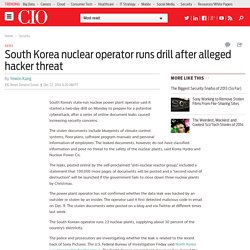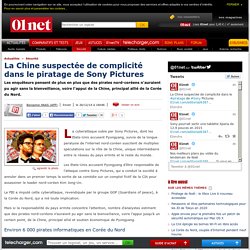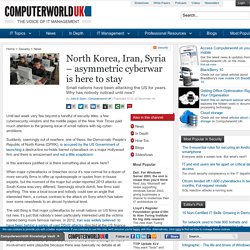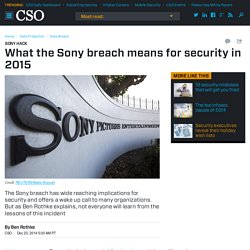

South Korea nuclear operator runs drill after alleged hacker threat. South Korea’s state-run nuclear power plant operator said it started a two-day drill on Monday to prepare for a potential cyberattack, after a series of online document leaks caused increasing security concerns.

The stolen documents include blueprints of climate control systems, floor plans, software program manuals and personal information of employees. The leaked documents, however, do not have classified information and pose no threat to the safety of the nuclear plants, said Korea Hydro and Nuclear Power Co. The leaks, posted online by the self-proclaimed “anti-nuclear reactor group,” included a statement that 100,000 more pages of documents will be posted and a “second round of destruction” will be launched if the government fails to close down three nuclear plants by Christmas. La Chine suspectée de complicité dans le piratage de Sony Pictures. 01net le 26/12/14 à 16h46 La cyberattaque subie par Sony Pictures, dont les Etats-Unis accusent Pyongyang, suivie de la longue paralysie de l'internet nord-coréen suscitent de multiples spéculations sur le rôle de la Chine, unique intermédiaire entre le réseau du pays ermite et le reste du monde.

Les Etats-Unis accusent Pyongyang d'être responsable de l'attaque contre Sony Pictures, qui a conduit la société à annuler dans un premier temps la sortie de sa comédie sur un complot fictif de la CIA pour assassiner le leader nord-coréen Kim Jong-Un. Le FBI a imputé cette cyberattaque, revendiquée par le groupe GOP (Guardians of peace), à la Corée du Nord, qui a nié toute implication. Mais si la responsabilité du pays ermite concentre l'attention, nombre d'analystes estiment que des pirates nord-coréens n'auraient pu agir sans la bienveillance, voire l'appui jusqu'à un certain point, de la Chine, principal allié et soutien économique de Pyongyang. « Cela pourrait fort bien être la Chine. North Korea, Iran, Syria – Asymmetric Cyberwar is Here to Stay. Until last week very few beyond a handful of security titles, a few cybersecurity vendors and the middle pages of the New York Times paid much attention to the growing issue of small nations with big cyber-ambitions.

Suddenly, seemingly out of nowhere, one of these, the Democratic People’s Republic of North Korea (DPRK), is accused by the US Government of launching a destructive no-holds barred cyberattack on a major Hollywood firm and there is amazement and not a little scepticism. Is this wariness justified or is there something else at work here? When major cyberattacks or breaches occur it’s now normal for a dozen of more security firms to offer up spokespeople or quotes from in-house experts, but the moment of the major but under-reported 2013 attacks on South Korea was very different.
Seemingly struck dumb, few firms said anything. Ponder that the next time you log on to the Twitter or Gmail using 2FA – without the SEA attacks that option might still not exist. What the Sony Breach Means for Security in 2015. The recent (and perhaps ongoing) Sony breach was certainly one of the worst corporate data breaches we have seen to date.

As 2014 draws to a close, no one knows the details with certainty of who the perpetrator was. Even so, it’s undeniable that it’s a breach that will forever change the way Sony does business. [ Questions remain after FBI charges North Korea with attack on Sony Pictures ] As the year of information security ends in 2014, what does the Sony breach tell us about what will happen in 2015? Here are a few things I think can be said with certainty: This was yet another wake-up call – but many will still sleep through it.
Sony hack: Studio Tries to Disrupt Downloads of its Stolen Files. Sony Pictures Entertainment is fighting back.

The studio behind the “Spider-Man” franchise and “The Social Network” has taken technological countermeasures to disrupt downloads of its most sensitive information, which was exposed when a hacking attack crippled its systems in late November. The company is using hundreds of computers in Asia to execute what’s known as a denial of service attack on sites where its pilfered data is available, according to two people with direct knowledge of the matter. Sony is using Amazon Web Services, the Internet retailer’s cloud computing unit, which operates data centers in Tokyo and Singapore, to carry out the counterattack, one of the sources said.
The tactic was once commonly employed by media companies to combat Internet movie and music piracy. The breach has caused havoc within Hollywood’s inner circles as private correspondence between powerful producers and executives have exposed internal politics and petty gripes. More on the Sony Hack Attack.